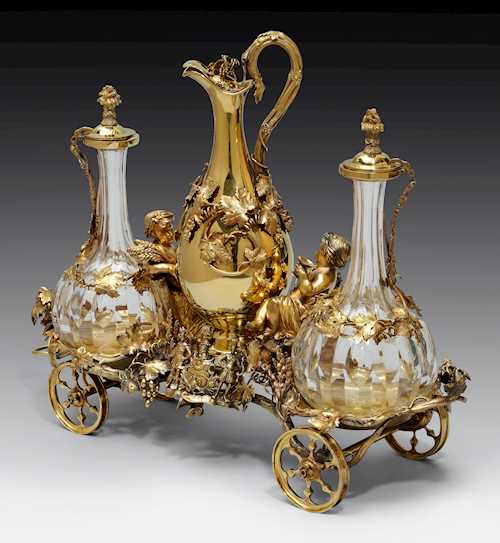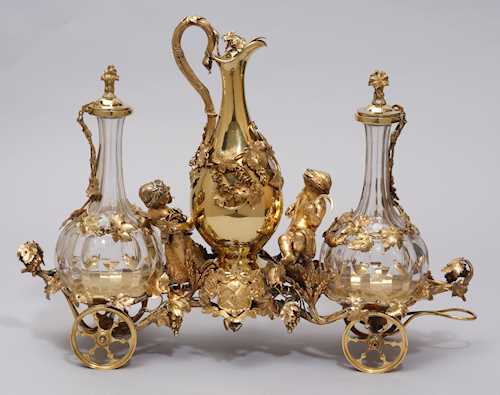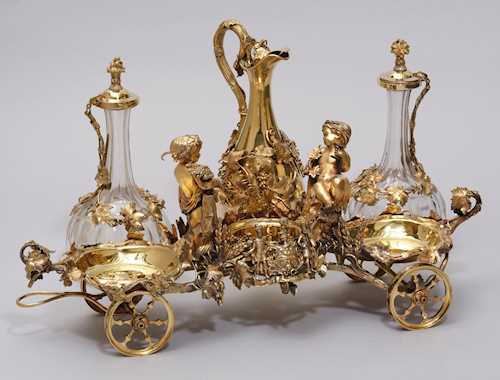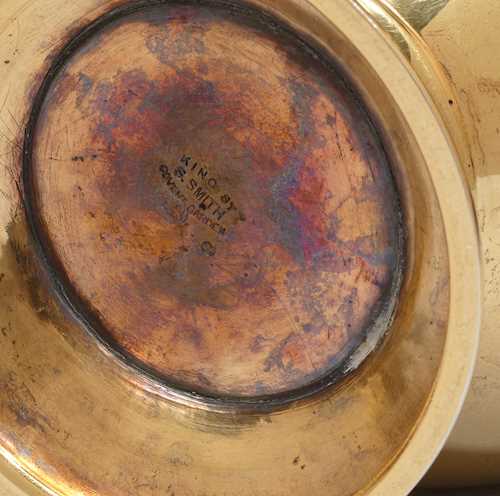
Lotto 1024* - A211 Splendore e Raffinatezza. Il Lusso Parigino del XIX Secolo - giovedì, 28. novembre 2024, 10h00
A VICTORIAN SILVER-GILT DECANTER TROLLEY
London, 1867/68. maker's mark Stephen Smith & Son.
Silver-gilt and cut crystal glass. Two mounted glass aiguières and a silver-gilt pouring ewer on a carriage with two putti in the guise of Bacchantes. Lavish vine leaves and tendril decoration. On the central, slightly raised plateau, a magnificent cartouche with coats of arms of the Worshipful Company of Distillers and motto on either side.
Carafes: H 31 cm; ewer: H 33 cm; carriage: L 60 cm. Ca. 3400 g (without carafes).
At the beginning of the 19th century, such decanter trolleys were increasingly used on the laid tables of England. With four wheels and a swivel handle, they were used in particular at more formal occasions to pass the wine from guest to guest at a long table. According to legend, this type of wine carriage was invented at the suggestion of King George IV to ensure that guests at the royal table were efficiently supplied with wine. Decanter trolleys for two bottles, known as “double wine coaster wagons”, as well as their boat-shaped counterparts, known as “jolly boat coasters”, have survived in a wide variety of designs.
The present example, with three plateaus and original bottles, was executed with particular care and opulent decoration. The iconographic program, with its bacchantes, grape leaves and vines, follows a playful naturalism embedded in the English Rococo revival of the 1860s. The accurate details of the foliage point to the origin of the maître of this extraordinary work, the talented goldsmith Stephen Smith. His company Stephen Smith & Sons emerged from the workshops of Digby Scott and Benjamin Smith II (1764–after 1818), who, together with Paul Storr, were the main suppliers of the large Regency company Rundell, Bridge and Rundell. Although Stephen Smith's work was usually more restrained than that of his father, Benjamin Smith II, the latter's influence is clearly evident here.
The present example, with three plateaus and original bottles, was executed with particular care and opulent decoration. The iconographic program, with its bacchantes, grape leaves and vines, follows a playful naturalism embedded in the English Rococo revival of the 1860s. The accurate details of the foliage point to the origin of the maître of this extraordinary work, the talented goldsmith Stephen Smith. His company Stephen Smith & Sons emerged from the workshops of Digby Scott and Benjamin Smith II (1764–after 1818), who, together with Paul Storr, were the main suppliers of the large Regency company Rundell, Bridge and Rundell. Although Stephen Smith's work was usually more restrained than that of his father, Benjamin Smith II, the latter's influence is clearly evident here.
CHF 30 000 / 50 000 | (€ 30 930 / 51 550)





